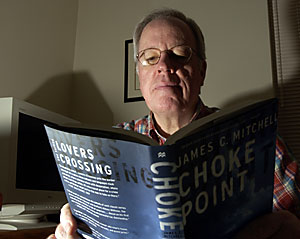 |
|
CHRIS CODUTO/Arizona Daily Wildcat
|
Journalism professor Jim Mitchell is leaving the university at the end of the spring semester to pursue a career writing crime and mystery novels.
|
|
|
By Cassie Tomlin
Arizona Daily Wildcat
Monday, November 29, 2004
Print this
After this school year, journalism professor Jim Mitchell will end a chapter in his extensive print and broadcast career. This spring semester at the UA will be the last for the former radio broadcaster, news anchor and lawyer, who will retire from teaching to write novels, learn to fly a helicopter and travel to New Zealand.
"I'm just clicking things off the list," he said.
Professor Mitchell has been the sole instructor of media law and writing for television news courses at the UA since 1995, when he accepted the teaching job a week before the semester began. Mitchell said his news experience and five years of law school qualified him to take up the class despite the short notice.
In preparation, Mitchell remembered his favorite law school professors from a few years earlier.
"I emulated their methods - at least that's the target I had in mind," he said with a laugh.
In 2001 and 2002 Mitchell received the journalism department's Hugh and Jan Harelson Award for Excellence in Teaching by the Journalism Student Advisory Council, an honor he said he feels lucky to have been awarded.
UA Journalism department head Jacqueline Sharkey says Mitchell will be sorely missed by journalism students and faculty.
"Professor Mitchell is an outstanding teacher and an intellectual leader in the department," she said. "He is so obviously passionate for the subject and creates such excitement."
Sharkey said Mitchell's expertise on his subject makes him an outstanding teacher.
"He has an impressive command of media law and an ability to involve students in discussions," Sharkey said. "He turns subtle and complex media laws into concepts that are easily acceptable for students."
Stephanie Corriero, a journalism senior taking Mitchell's media law class, also appreciates Mitchell's background in the field and his passion for the subject.
"He's an exceptional teacher," she said. "Every time we address a new topic he's relating it to something he dealt with when he was a reporter. He goes into teaching enthusiastically and really wanting us to get into the stuff."
Mitchell is currently at work on two novels. One is a follow up to his previous two books, a private investigation tale, "Lovers Crossing," that was published last summer, and "Choke Point," which was released in October. Both novels are set in and around Tucson and the Mexico border.
Mitchell's journalism career began in Hawaii when he was 18 and got a job "doing everything" at a local radio station.
"In those days, the pay was low and the checks bounced anyway, so any idiot could get a job in the news business," Mitchell said.
In 1966, he found himself in Los Angeles working at another radio station. He was broadcasting live from the Ambassador Hotel when Senator Robert Kennedy was assassinated on primary election night in 1968. As soon as he realized what had happened, Mitchell raced to the closest hospital, where he was sure medics would take Kennedy's body.
"You don't forget that, I'll tell ya. You see some bad stuff in the news business, but you do the best job you can under the circumstances," Mitchell said.
Though Mitchell has covered his share of misfortunes, he notes the job's illustrious moments.
In 1971 while working as a general assignment reporter at a television news station in New York City, a retirement luncheon for the Secretary General of the United Nations, Burmese diplomat U Thant, brought him an unexpected interview.
Mitchell went to the lunch at the Waldorf Astoria hoping to get a 30-second voice-over spot until he saw John Lennon sitting in the corner of the room.
"I walked over to introduce myself, but before I could, he stood up and said, 'Hello Jim, I've seen you on the telly!'"
In 1976 Mitchell left New York to spend the rest of his broadcast career at WHAS-TV in Louisville, Kentucky, before moving to Arizona in 1993. In 1981 his coverage of sewer explosions that ravaged the city helped the station win the Society of Professional Journalists award for best spot news reporting.
Mitchell said he hopes he has instilled in his students a sense that media law matters.
"The First Amendment is a precious thing that we Americans take for granted," he said. "People are dying for the freedoms we have and I hope the students have an appreciation for that, and also an understanding of our law and how it works and why."
Mitchell said after he retires, he will continue writing occasional opinion and editorial articles if something irritates him.
"And there's usually something that irritates me," he says.
Mitchell said when he leaves the UA, he'll miss the pride he gets from his successful pupils.
"My greatest pleasure is watching students go out and do well," he said. "Seeing a student's byline or hearing from them when they're doing well is a great feeling. It's a tough business, and sometimes it's a nasty business, but I like to see everyone enjoying it and being satisfied."
